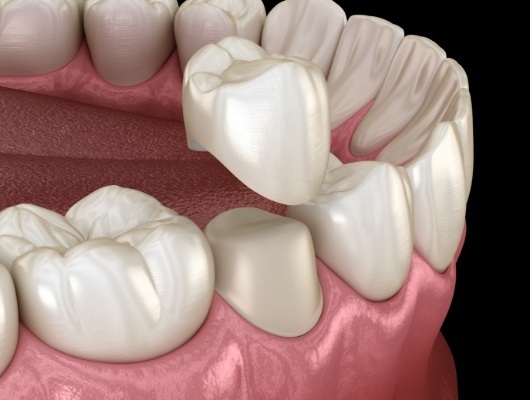Dental Crowns – Denton, TX
Custom-Made Smile Restorations

Your teeth have a layer of protection called enamel. As the strongest material in your body, it can still decay, break, or even get knocked out. At Prime Dentistry, Dr. Ahir uses dental crowns to restore your smile to its full beauty and function. These custom-made restorations seamlessly blend into your smile to safeguard teeth suffering from decay and damage. Keep reading to learn everything that you need to know about dental crowns in Denton or call us today.
Why Choose Prime Dentistry for Dental Crowns?
- 3D Printer Used for Dental Crown Creation
- Dentist Focused on Results & Patient Comfort
- Sedation Dentistry Available
What Are Dental Crowns?

Dental crowns get their name because they are designed to literally cover or cap the entire visible portion of your tooth, known as the crown of the tooth. We make our dental crowns from high-quality ceramics to restore, strengthen, and protect your teeth. Crowns can also be used to fix misshapen teeth or to conceal stubborn discoloration.
How to Determine If You Need a Dental Crown

The best way to know if you need a dental crown is to visit our practice. Our expert dentist will evaluate your smile to recommend the best treatment for you. When it comes to dental crowns, they are often best for patients who have cavities that are too large for fillings, misshapen teeth, cracked teeth, damaged teeth, decay, or other issues with dental structures.
Benefits of Dental Crowns

Our dental crowns bring patients many benefits, but these are some of the most popular:
- These restorations complete your smile for maximum beauty and naturality.
- Custom-made crowns give you the confidence to chew, talk, and laugh without worrying about a damaged smile.
- Dental crowns can be shaded to match your natural teeth.
- These restorations feel like your natural teeth, allowing you to forget about previous oral health issues that you were facing with a damaged smile.
Dental Crown FAQs
Are Dental Crowns Permanent?
Dental crowns aren’t permanent, but they are long-lasting. On average, they can protect your tooth from anywhere between 5 to 15 years or longer. When your dentist reshaped your tooth for a dental crown, this procedure is not reversible, as tooth enamel is unable to reshow. That tooth will always need a crown going forward. That being said, crowns protect the underlying tooth from enduring additional damage, helping the tooth to survive for much longer than it likely would have otherwise. You can keep your crown in good shape for many years to come if you keep up excellent oral hygiene, continue to see your dentist, and maintain healthy lifestyle habits.
Do Dental Crowns Get Cavities?
It is impossible for a dental crown itself to develop cavities. However, the tooth underneath it still can. In fact, a crowned tooth has about the same risk of decay as an uncrowned tooth. Poor oral hygiene makes it possible for bacteria and plaque to form around the gumline where the tooth meets the crown, resulting in decay. You can prevent cavities in crowned teeth the same way as you do with any other tooth. Brush twice and floss every day and continue to see your dentist for routine visits.
Does It Hurt to Get a Dental Crown?
Just like when you get a filling, your dentist will numb the tooth that they will be working on with a local anesthetic, so you shouldn’t be able to feel a thing. You may experience some sensitivity for a few days after your procedure, but this should be mild and temporary. Using over-the-counter pain relievers and a cold compress is usually enough to manage this.
Do Dental Crowns Feel Natural?
Within a few days of receiving your permanent crown, it should start to feel increasingly natural. Crowns are made from durable materials that stand up to everyday chewing forces, so eating shouldn’t feel strange. Because your dentist reshaped your tooth was to ensure that the crown would fit comfortably withing your mouth. On top of that, your crown is based off impressions taken of your smile, so it shouldn’t feel much different from your other teeth.





New Patient 1st Visit
Second Opinions

